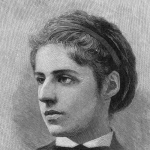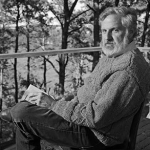Rosh-Hashanah, 5643
Not while the snow-shroud round dead earth is rolled,
And naked branches point to frozen skies.—
When orchards burn their lamps of fiery gold,
The grape glows like a jewel, and the corn
Then the new year is born.
Look where the mother of the months uplifts
In the green clearness of the unsunned West,
Her ivory horn of plenty, dropping gifts,
Cool, harvest-feeding dews, fine-winnowed light;
Tired labor with fruition, joy and rest
Profusely to requite.
Blow, Israel, the sacred cornet! Call
Back to thy courts whatever faint heart throb
With thine ancestral blood, thy need craves all.
Leads on from anguish wrought by priest and mob,
To what undreamed-of morn?
For never yet, since on the holy height,
The Temple’s marble walls of white and green
Carved like the sea-waves, fell, and the world’s light
Went out in darkness,—never was the year
Greater with portent and with promise seen,
Than this eve now and here.
Even as the Prophet promised, so your tent
Hath been enlarged unto earth’s farthest rim.
To snow-capped Sierras from vast steppes ye went,
Through fire and blood and tempest-tossing wave,
For freedom to proclaim and worship Him,
Mighty to slay and save.
High above flood and fire ye held the scroll,
Out of the depths ye published still the Word.
No bodily pang had power to swerve your soul:
Ye, in a cynic age of crumbling faiths,
Lived to bear witness to the living Lord,
Or died a thousand deaths.
In two divided streams the exiles part,
One rolling homeward to its ancient source,
One rushing sunward with fresh will, new heart.
By each the truth is spread, the law unfurled,
Each separate soul contains the nation’s force,
And both embrace the world.
Kindle the silver candle’s seven rays,
Offer the first fruits of the clustered bowers,
The garnered spoil of bees. With prayer and praise
Rejoice that once more tried, once more we prove
How strength of supreme suffering still is ours
For Truth and Law and love.




















Comment form: